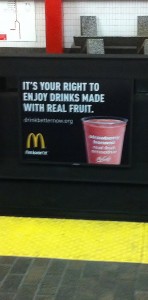The annual Superbowl has become the best time of year to hear public discussion about advertising, something I wish we could be more critically aware of year-round. This year’s focus was Coca-Cola’s multi-lingual rendition of America the Beautiful, celebrating the nation’s demographic and geographic diversity. Racist and xenophobic backlash online predictably generated the best kind of publicity for Coca-Cola; one NBC anchor declared: “Coca-Cola has always been about inclusion. And they clearly know how to get people talking about their brand.”
Some commentators observed that Coca-Cola is not “about” inclusion, it is about selling its products. But a disheartening number jumped to defend Coca-Cola and applaud its message. A commercial message: a strategy to associate Coke with patriotic multicultural values. At a cost well over $4 million, the ad’s aesthetic or social value is secondary. Its purpose is commercial: an investment in a brand.
The clip’s message is clear: the US encompasses a beautiful diversity, but what unites us all is Coke. Calling Coca-Cola an ally in the work for justice and equality requires tremendous feat of amnesia. Not long ago this corporation held the record for the largest racial discrimination settlement in U.S. history. Coca-Cola doesn’t have feelings or opinions, inclusive or otherwise. It is a corporation, not a human being. No advertisement should lull us into attributing motives other than profit to an institution bound by law and structure to prioritize its own perpetuation and growth. No marketing angle will change Coke’s labor violations and ongoing racial discrimination, or hold this corporation accountable for its global abuses.

Coca-Cola hasn’t cornered the market on hypocritical advertising. Take, for example, recent appeals to feminist values like the Pantene series which flies in the face of parent Procter & Gamble’s corporate track record of gender discrimination and sexual harassment of female employees, not to mention its funding for reactionary and anti-gay political candidates. Marketing statements don’t signify a policy or commitment of any kind. Often the same corporation promotes different messaging around its male-targeted brands.
Information on corporate practices is easily available, there’s no excuse for relying on ads and misinformation for an impressionistic view of the corporations that dominate our media and consumer landscape. It’s satisfying to stand up to misogynist or racist backlash, but we should avoid adding fuel to the fire which seeks to burn away the corporation’s track record and actual practices in a blinding crucible of positive associations. By provoking the trolls, Coke and Pantene hope to summon our (brand) loyalty by provoking the bogeyman on the right. Personally, I get enough of that at the ballot box. I’d rather hear corporate actions speaking louder than ads.